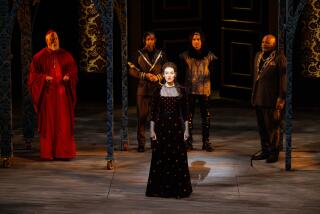STAGE REVIEW : Not an Enchanted Evening for ‘Twelfth Night’
Last summer in West Germany, where the director is king, a West Berlin theater was presenting Shakespeare’s “Twelfth Night” under its subtitle, “What You Will.” The ideal command for a director to let his imagination go.
Never mind that Shakespeare inserts a cautionary aside (in the mouth of a servant), as the once contained, puritanical Malvolio now fantasizes himself as a count in love with countess Olivia--”O peace, now he’s deeply in; look how imagination blows him.” Imagination is the prime natural resource of Illyria, this romantic comedy’s Mediterranean Utopia. It makes fertile soil for love to grow: “Twelfth Night” is about how make-believe is an act of the heart.
Directors fond of Shakespeare tend to be especially fond of a play, such as this one, in which one can essentially invent a world. So it isn’t surprising that veteran Shakespeare director Thomas F. Bradac mentions the subtitle in the program notes for his new Grove Shakespeare Festival production of “Twelfth Night.” He comments on a world “where reality and illusion are confused . . . our production establishes the stage as Illyria, whose inhabitants (actors) and devices of illusion are evident.”
Tony Maggi’s set, stripped down to a multileveled platform stage with narrow, chiffon curtains that can become ship’s sails or garden hedges, also makes visible a costume change area on both sides of the stage. We’ll see the actors come on, prepare for their roles, enter Illyria in costume, then exit. Shades of Paul Verdier’s “1789,” itself an offspring of Theatre du Soleil’s theater without walls.
That is, that’s what we assume we’ll see. The reality of Bradac’s stab at exposing theatrical illusions is actually somewhat grim. The ideas on stage are not backing up the ideas in the notes.
After the cast, led by Gary Bell as Feste, the court jester, presents a friendly introduction of the characters, they get off and let the show begin to the sound of shaking metal sheets for thunder, Liz Stillwell’s pulsating lights and actors waving those chiffon curtains back and forth. Bradac even reverses the order of the first two scenes, cutting to the chase, so to speak. There seems to be a point of view going on here.
Then things settle down, and before long, it’s a night of perfectly competent, perfectly average American Shakespeare. The changing areas to the sides go virtually unused, becoming emblematic of Bradac’s production as a whole. Stylistic notions, given the barest suggestion, become more frustrating when they’re prevented from going the full distance. The people in Illyria, so hell-bent on making things up and changing clothes as the situation dictates, would never put up with such half-hearted leaps--no, hops--of imagination.
Somewhere along the way, the urge to enchant lost steam; the resultant mise en scene , like Laura Deremer’s maddeningly inconsistent costuming, looks clunky. The actors enter and exit through upstage door openings as if they’re in a stylized office-warehouse. Once in a while, they’re asked to freeze in tableau for no apparent reason, and, again, with no consistent pattern. Even Chuck Estes’ music sounds half-done.
But since this is an evening of competent American Shakespeare, the lead actors emit a good deal of charm. And intelligence, in the cases of Bell’s Feste, who suggests a savant moonlighting as a clown for the money, and John-Frederick Jones’ Malvolio, the show’s most shaded performance. Right behind them, in various forms of nonsense and romance, are Steve Henry’s Toby Belch, Steve Peterson’s Andrew Aguecheek and Kerry Noonan’s Viola. Alicia Woolerton begins her Olivia very mechanically, but then loosens up. Carl Reggiardo gives another of his grim-faced, stentorian turns as the love-lorn Duke, while Marc Whitmore’s put-upon Antonio is just grim-faced.
These actors, by themselves, can’t send us on a magic carpet ride. They need a strong vision to give them a boost. This time out, there’s a power failure.
At 12852 Main St., Garden Grove, Wednesdays through Saturdays, 8 p.m., Jan. 27 and Feb. 3, 7:30 p.m., Feb. 11, 3 p.m., until Feb. 17. Tickets: $16-$20; (714) 636-7213.
More to Read
The biggest entertainment stories
Get our big stories about Hollywood, film, television, music, arts, culture and more right in your inbox as soon as they publish.
You may occasionally receive promotional content from the Los Angeles Times.










